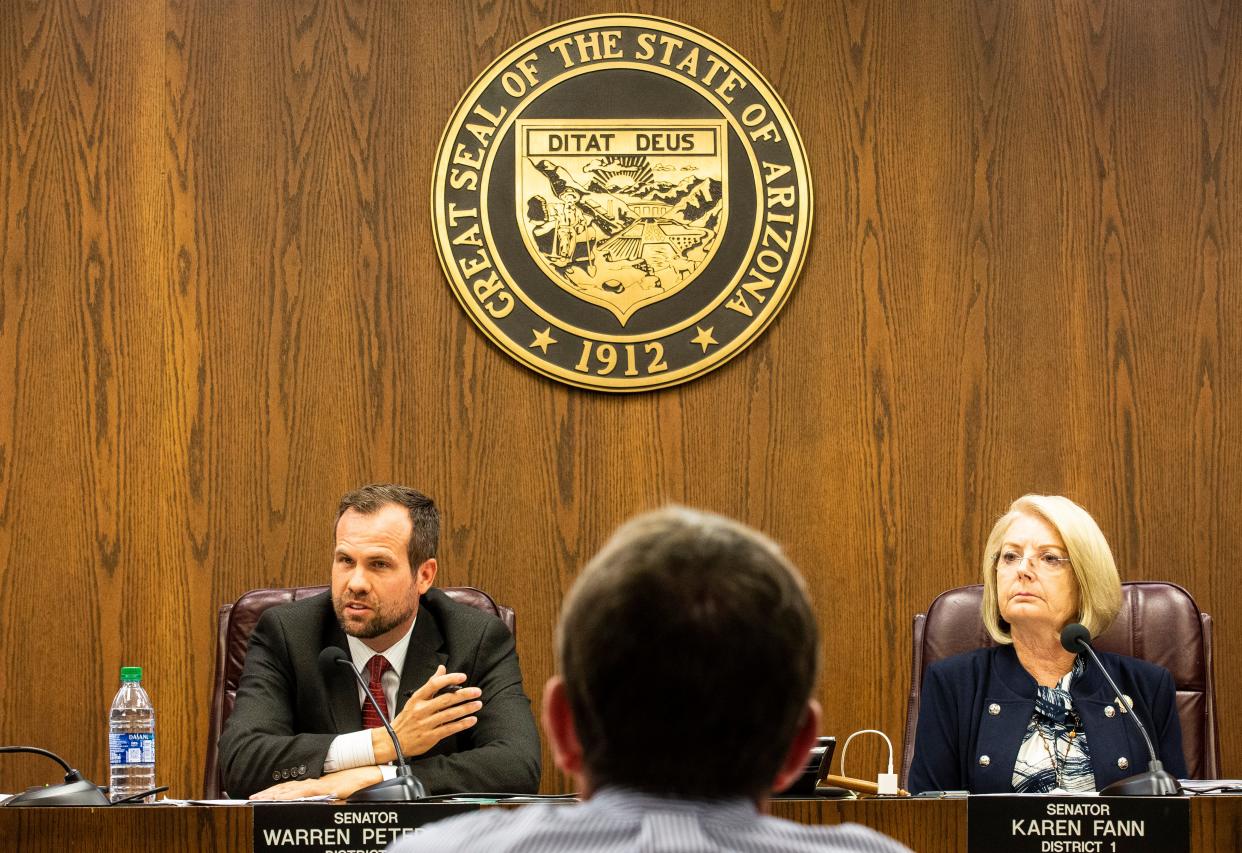Judge's ruling keeps some Senate 'audit' texts, emails secret but could release others

- Oops!Something went wrong.Please try again later.
The Arizona Senate can keep secret emails and texts with contractors who worked on the "audit" of 2020 election results, even if they hadn't yet been hired when they communicated with legislators.
A judge ruled several specific records are protected by "legislative privilege" and don't have to be made public under the law.
The privilege extends to e-mails from Cyber Ninjas CEO Doug Logan, the Senate's lead "audit" contractor, about processes and procedures surrounding the only privately run recount of 2020 ballots in America. Those include discussions of ballot inspection, worker training and quality control issues.
"The Senate contends contractors and consultants are equally protected. This Court agrees with the Senate," Maricopa County Superior Court Judge Bradley Astrowsky wrote in a July 13 ruling. "Courts in Arizona and elsewhere have affirmed that the privilege shields a legislator’s communications with a third party that is serving as a consultant or advisor in connection with a legislative project."
Astrowsky's ruling follows a July 6 hearing on a 2021 public records lawsuit against the Senate and Cyber Ninjas by The Arizona Republic for "audit" records. The Republic sought access to 41 specific records the Senate said should be protected from public inspection.
Astrowsky did not completely side with the Senate. He said communications dealing with administrative decisions surrounding the audit, such as hiring consultants, how much to pay them, and whom to hire, are not protected. "Accordingly, the Senate must turn over these e-mails," he said.
The case could serve as a benchmark for how much of the public's business can be conducted in private and the latitude elected leaders have to withhold documents from inspection.
The Republic's lawsuits seeking to make public Arizona "audit" documents have forced the disclosure of tens of thousands of records detailing the highly partisan nature of the ballot review and the role allies of former President Donald Trump had in planning, managing and financing it.
The ruling appears only to apply to Senate communications.
Cyber Ninjas and Logan are under a different court-ordered mandate to turn over thousands of communications from the audit. Logan has defied multiple court orders to turn over records. A judge in January 2022 fined Logan's company $50,000 a day until he complied. The Arizona Supreme Court affirmed the fine in July 2022, rejecting Logan's request to rescind it. The fines now total in the millions of dollars.
Astrowsky at the start of the hearing denied Logan's latest attempt to restrict what documents he is required to turn over. The judge said Logan needs to respond to existing court orders.
Affirming senators' right to keep many communications private
In ordering the release of some Senate records and allowing others to remain private, Astrowky hewed closely to guardrails established by The Arizona Supreme Court in August, when it ruled the Senate could keep many "audit" records private to protect the deliberative legislative process.
The high court reversed rulings by a Maricopa County Superior Court judge and the Arizona Court of Appeals that concluded political communications were not protected and could not be withheld on legislative privilege claims.
The court said the Senate’s internal communications concerning the authorization, planning and findings of the "audit" are excluded from disclosure under the Arizona Public Records Law.
But it didn't give legislators carte blanche. The court said some discussions of employment, personnel issues and contract negotiations are not considered privileged because they are administrative, rather than legislative, functions.
It sent the case back to Superior Court and ordered the Senate to provide better explanations of what was contained in the emails, texts and other communications to justify withholding them.
It also prescribed a method for challenging claims of privilege, leading the Senate in November to create a new 243 page "privilege log" summarizing each record and why it was withheld.

Republic attorney: 'A far-reaching expansion of the privilege'
Lawyers for The Republic argued many entries in the log fell outside of the privilege and asked Astrowsky to order their release, or to conduct his own private "in camera" review.
Matthew Kelley, the attorney representing The Arizona Republic, argued the Senate was trying to assert privilege where none existed, especially when it came to communications among individuals who hadn't yet been hired as contractors or consultants.
"The Senate does not cite any Arizona authority for such a far-reaching expansion of the privilege," Kelley wrote in a motion. "To the contrary, Arizona courts have stressed that the legislative privilege, like all evidentiary and testimonial privileges, must be construed narrowly."
Phoenix attorney Kory Langhofer, who represents the Senate, pushed back against the claim. He said The Republic was using a "spuriously broad" definition to get hold of records.
Legislative privilege covers communications between a legislator and outside consultants or advisers so long as it is in furtherance of legislative activity, Langhofer said.
He asked the judge during the hearing to consider "the best interests of the state" in limiting the release of records.
"We have seen in this case more than 80,000 pages produced," he said. "The purposes of the Public Records Act have been satisfied. The level of transparency on this audit that, I think, is unparalleled in any other public records request in the state's history. Hundreds of thousands of dollars. More than two years of litigation."
Astrowsky flatly rejected the argument that the volume of records, the cost to produce them and their subsequent value are contrary to the best interest of the state.
"Litigation exhaustion, while it may be a real thing, is not sufficient to outweigh the public’s interest to information pertaining to a general election audit," he said in his ruling.
Astrowsky went through each record based on the Senate's summary descriptions but concluded a full review of them was not necessary to determine if they were administrative functions and subject to disclosure.
He also opened the door for the Senate to appeal, keeping all records private until July 24 to allow legislators time to file a special action.
Among the records Astrwosky reviewed for privilege:
∎ Privileged: Emails involving then-Senate President Karen Fann and Cyber Ninjas CEO Doug Logan before she hired him to lead the hand count of 2.1 million ballots cast in Maricopa County
∎ Privileged: Emails from Logan copied to Mike Roman, a high ranking official in the Trump administration, who was involved in raising funds for the "audit."
∎ Privileged: Texts between Fann and retired Army Col. Phil Waldron, who attended meetings with former President Donald Trump and pushed baseless conspiracy theories.
∎ Privileged: An email from then-Sen. Vince Leach to Fann and others discussing ballot recount costs.
∎ Not privileged: Email exchanges among Senate staffers about Cyber Ninjas contract terms.
∎ Not privileged: Emails written on the Arizona Audit email account about recruiting, vetting and assigning volunteer observers.
Already released records detail partisan, sloppy nature of ballot review
Records released so far by The Senate and Cyber Ninjas show the "audit" was a gaffe-prone partisan exercise by Trump allies more concerned with sowing doubt in the electoral process than coming up with a definitive vote count.
Fann hired the Cyber Ninjas after privately communicating with Waldron. Although neither Logan nor his company had election auditing experience, Fann at the time said he was "well qualified" and "well experienced."
The review was supposed to take a few weeks and cost taxpayers $150,000. It ultimately took about two months and so far has cost Arizona more than $5 million.
The Senate has provided communications about contracts, payments of contracts, contract negotiations, text messages and more than 20,000 emails. The Senate also requested Logan turn over all of Cyber Ninjas’ communications.
An independent review by a team of data analysts in June found Logan improperly redacted thousands of texts and eliminated others. It identified missing messages, long gaps in communications and conversations that dropped in midstream.
Thousands of text messages to and from Logan show he was part of a coordinated campaign to challenge results in several swing states when Fann tapped him to lead the hand count.
They also show Logan couldn't make sense of his own data in the Arizona count and had no way to quantify results. In a series of private messages, Logan said "our numbers are screwy" and that he would be satisfied so long as the count was right "most of the time."
Senate records make clear Cyber Ninjas never had to deliver a definitive report about its review — it only had to try. Records show how a fake elector from Pennsylvania ran the floor where ballots were being counted inside Veterans Memorial Coliseum. They also show a current Trump lawyer acted as a liaison between Logan and the former president.
While Logan confirmed President Joe Biden's victory in Arizona, his report to the Senate focused on so-called anomalies, instilling distrust in voting machines and encouraging partisan calls for paper ballot tabulations, hand recounts and more "audits."
Kelley emphasized how the Republic's lawsuit already has aided the public in getting records the Senate had no intention of making public.
"As a result of this litigation, we have gotten far more records than the Senate had pledged to release," he said.
"Your Honor, respectfully, the government doesn't get to decide what has informational value and what doesn't," he said at the July 6 hearing. "These are public records. The public deserves to have them and evaluate for themselves the informational value of them."
Robert Anglen is an investigative reporter for The Republic. Reach him at robert.anglen@arizonarepublic.com or 602-444-8694. Follow him on Twitter @robertanglen.
This article originally appeared on Arizona Republic: Judge's ruling keeps some Arizona Senate 'audit' documents secret

